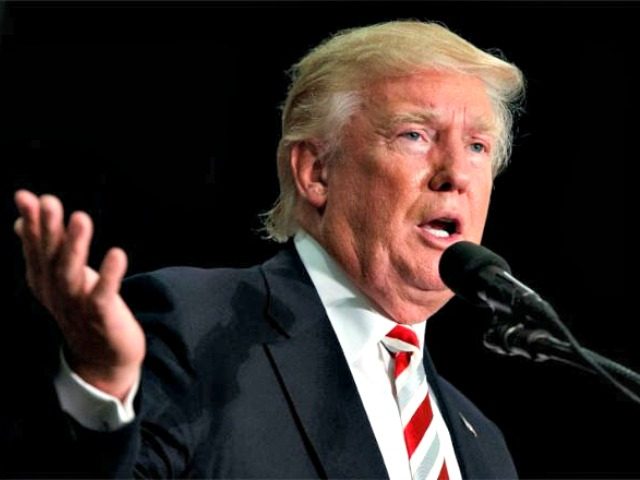In an interview with Reuters on Thursday, President Donald Trump expressed frustration that the previous administration did not take stronger action against Pyongyang and that China refuses to bring its unruly client state to heel.
“It’s very late. We’re very angry at what he’s done, and frankly, this should have been taken care of during the Obama administration,” Trump said. He also said North Korea’s ballistic-missile and nuclear programs presented a “very dangerous situation,” and that China “can end it very quickly in my opinion.”
“I think China has tremendous control over North Korea, whether they say so or not. They could solve the problem very easily if they want to,” he elaborated.
He added criticism of China’s military buildup in the South China Sea and stressed that it would have been better for the Obama administration to deal with such issues years ago, instead of allowing them to get out of hand:
I know exactly what’s going on between China and North Korea and everybody else. But I don’t like talking about military strategy in newspapers… I’m not liking it. This didn’t take place under the Trump administration, this took place under the Obama administration. Many things took place that should not have been allowed. One of them is the building of a massive, you know, massive military complex in the middle of the South China Sea.
And don’t forget I’ve only been here for four weeks. This is something that took place and has been started three years ago and you were in a much better negotiating position three years ago. I am not happy about it.
For some reason, Reuters felt obliged to cover for China in a brief editorial digression:
China has made clear that it opposes North Korea’s nuclear and missile programs and has repeatedly called for denuclearization of the Korean peninsula and a return to negotiations between Pyongyang and world powers.
But efforts to change Pyongyang’s behavior through sanctions have historically failed, largely because of China’s fear that severe measures could trigger a collapse of the North Korean state and send refugees streaming across their border.
In other words, China is allowing a dangerous situation to fester, possibly degenerating into a massive conventional war or nuclear exchange, because it doesn’t want its border violated by refugees. Apparently, border security is an acceptable concern for China.
Trump leveled the same criticism at China last month on Twitter before his inauguration, in classic Trumpian style:
In theory, China recently took strong measures against North Korea’s nuclear program (and possibly the chilling assassination of dictator Kim Jong-un’s half-brother Kim Jong-nam with a chemical weapon) by banning imports of North Korean coal, although some analysts have said the Chinese sanctions are not as severe as they appear, because so much of China’s annual quota of North Korean coal has been shipped already.
There are even theories China is staging a political break with North Korea because they want Trump to solve the North Korean problem for them. In fact, the Chinese said as much on Friday, in response to Trump’s interview with Reuters, as reported by Australia’s News.com:
“We have said many times already that the crux of the North Korean nuclear issue is the problem between the United States and North Korea,” Chinese Foreign Ministry spokesman Geng Shuang said on Friday.
“We hope the relevant parties can shoulder their responsibilities, play the role the should, and together with China play a constructive role for peace and stability on the Korean peninsula and for its denuclearisation,” he added. The official Xinhua news agency said China’s influence on North Korea had been exaggerated.
“The Trump White House needs to make the first move and talk to Pyongyang. The United States stands to lose nothing for trying this,” it said in an English- language commentary.
If it is all geopolitical theater, North Korea is energetically playing its part. On Friday, NBC News quoted North Korean state media delivering what seems to be its first public condemnation of China ever.
The broadside from Pyongyang’s KCNA news agency obliquely referred to “a neighboring country, which often calls itself a friendly neighbor” and accused this unnamed country of “mean behavior” and “dancing to the tune of the U.S.”
China’s foreign ministry hastened to reassure North Korea that it was indeed a “friendly neighbor” that desires a “healthy and stable relationship.”
Trump touched on the deployment of American anti-missile technology to protect South Korea in the Reuters interview and suggested such systems could be deployed to Japan and elsewhere. “There’s talk of a lot more than that. We’ll see what happens,” he said.
He also said it was “very late in the picture right now” for a meeting with North Korean dictator Kim Jong-un, but added, “I would never say no.”
Trump floated the possibility of such a meeting during the 2016 presidential campaign, and a high-ranking North Korean defector has said Kim might be open to the possibility, although the defector also believed it would be a serious mistake for Trump to confer legitimacy on the dictator by meeting with him.

COMMENTS
Please let us know if you're having issues with commenting.